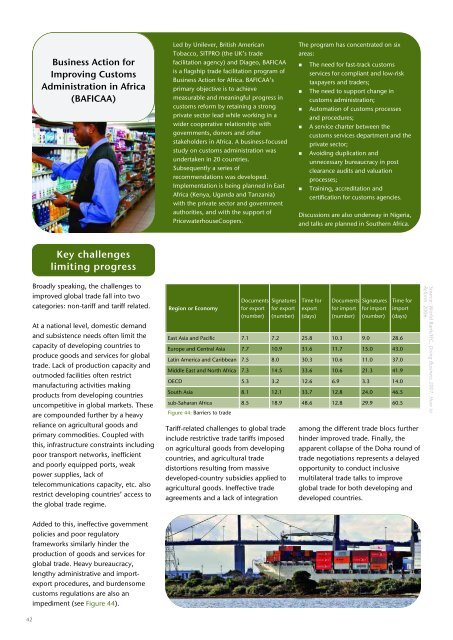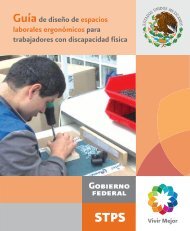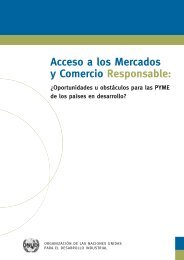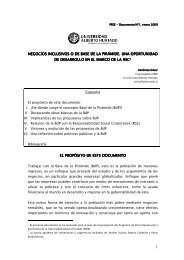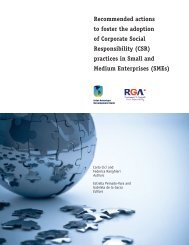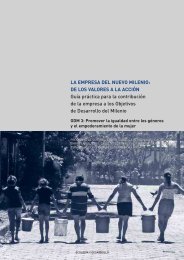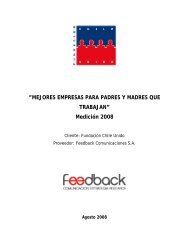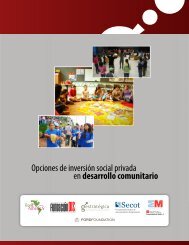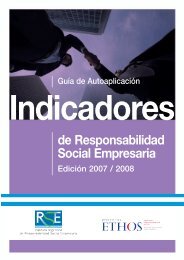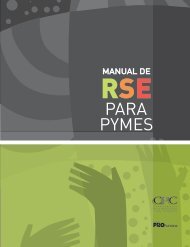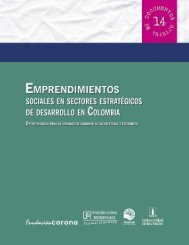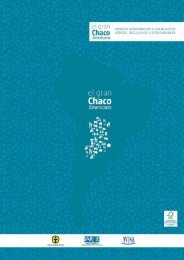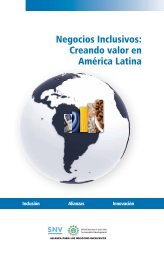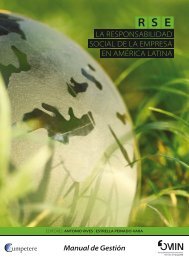Doing Business with the World - Mapeo de Promotores de RSE
Doing Business with the World - Mapeo de Promotores de RSE
Doing Business with the World - Mapeo de Promotores de RSE
Create successful ePaper yourself
Turn your PDF publications into a flip-book with our unique Google optimized e-Paper software.
<strong>Business</strong> Action forImproving CustomsAdministration in Africa(BAFICAA)Led by Unilever, British AmericanTobacco, SITPRO (<strong>the</strong> UK’s tra<strong>de</strong>facilitation agency) and Diageo, BAFICAAis a flagship tra<strong>de</strong> facilitation program of<strong>Business</strong> Action for Africa. BAFICAA’sprimary objective is to achievemeasurable and meaningful progress incustoms reform by retaining a strongprivate sector lead while working in awi<strong>de</strong>r cooperative relationship <strong>with</strong>governments, donors and o<strong>the</strong>rstakehol<strong>de</strong>rs in Africa. A business-focusedstudy on customs administration wasun<strong>de</strong>rtaken in 20 countries.Subsequently a series ofrecommendations was <strong>de</strong>veloped.Implementation is being planned in EastAfrica (Kenya, Uganda and Tanzania)<strong>with</strong> <strong>the</strong> private sector and governmentauthorities, and <strong>with</strong> <strong>the</strong> support ofPricewaterhouseCoopers.The program has concentrated on sixareas: The need for fast-track customsservices for compliant and low-risktaxpayers and tra<strong>de</strong>rs; The need to support change incustoms administration; Automation of customs processesand procedures; A service charter between <strong>the</strong>customs services <strong>de</strong>partment and <strong>the</strong>private sector; Avoiding duplication andunnecessary bureaucracy in postclearance audits and valuationprocesses; Training, accreditation andcertification for customs agencies.Discussions are also un<strong>de</strong>rway in Nigeria,and talks are planned in Sou<strong>the</strong>rn Africa.Key challengeslimiting progressBroadly speaking, <strong>the</strong> challenges toimproved global tra<strong>de</strong> fall into twocategories: non-tariff and tariff related.At a national level, domestic <strong>de</strong>mandand subsistence needs often limit <strong>the</strong>capacity of <strong>de</strong>veloping countries toproduce goods and services for globaltra<strong>de</strong>. Lack of production capacity andoutmo<strong>de</strong>d facilities often restrictmanufacturing activities makingproducts from <strong>de</strong>veloping countriesuncompetitive in global markets. Theseare compoun<strong>de</strong>d fur<strong>the</strong>r by a heavyreliance on agricultural goods andprimary commodities. Coupled <strong>with</strong>this, infrastructure constraints includingpoor transport networks, inefficientand poorly equipped ports, weakpower supplies, lack oftelecommunications capacity, etc. alsorestrict <strong>de</strong>veloping countries’ access to<strong>the</strong> global tra<strong>de</strong> regime.Region or EconomyDocumentsfor export(number)Signaturesfor export(number)sub-Saharan Africa 8.5 18.9 48.6 12.8 29.9 60.5Figure 44: Barriers to tra<strong>de</strong>Tariff-related challenges to global tra<strong>de</strong>inclu<strong>de</strong> restrictive tra<strong>de</strong> tariffs imposedon agricultural goods from <strong>de</strong>velopingcountries, and agricultural tra<strong>de</strong>distortions resulting from massive<strong>de</strong>veloped-country subsidies applied toagricultural goods. Ineffective tra<strong>de</strong>agreements and a lack of integrationTime forexport(days)Documentsfor import(number)Signaturesfor import(number)Time forimport(days)East Asia and Pacific 7.1 7.2 25.8 10.3 9.0 28.6Europe and Central Asia 7.7 10.9 31.6 11.7 15.0 43.0Latin America and Caribbean 7.5 8.0 30.3 10.6 11.0 37.0Middle East and North Africa 7.3 14.5 33.6 10.6 21.3 41.9OECD 5.3 3.2 12.6 6.9 3.3 14.0South Asia 8.1 12.1 33.7 12.8 24.0 46.5among <strong>the</strong> different tra<strong>de</strong> blocs fur<strong>the</strong>rhin<strong>de</strong>r improved tra<strong>de</strong>. Finally, <strong>the</strong>apparent collapse of <strong>the</strong> Doha round oftra<strong>de</strong> negotiations represents a <strong>de</strong>layedopportunity to conduct inclusivemultilateral tra<strong>de</strong> talks to improveglobal tra<strong>de</strong> for both <strong>de</strong>veloping and<strong>de</strong>veloped countries.Source: <strong>World</strong> Bank/IFC. <strong>Doing</strong> <strong>Business</strong> 2007: How toReform. 2006.Ad<strong>de</strong>d to this, ineffective governmentpolicies and poor regulatoryframeworks similarly hin<strong>de</strong>r <strong>the</strong>production of goods and services forglobal tra<strong>de</strong>. Heavy bureaucracy,lengthy administrative and importexportprocedures, and bur<strong>de</strong>nsomecustoms regulations are also animpediment (see Figure 44).42


